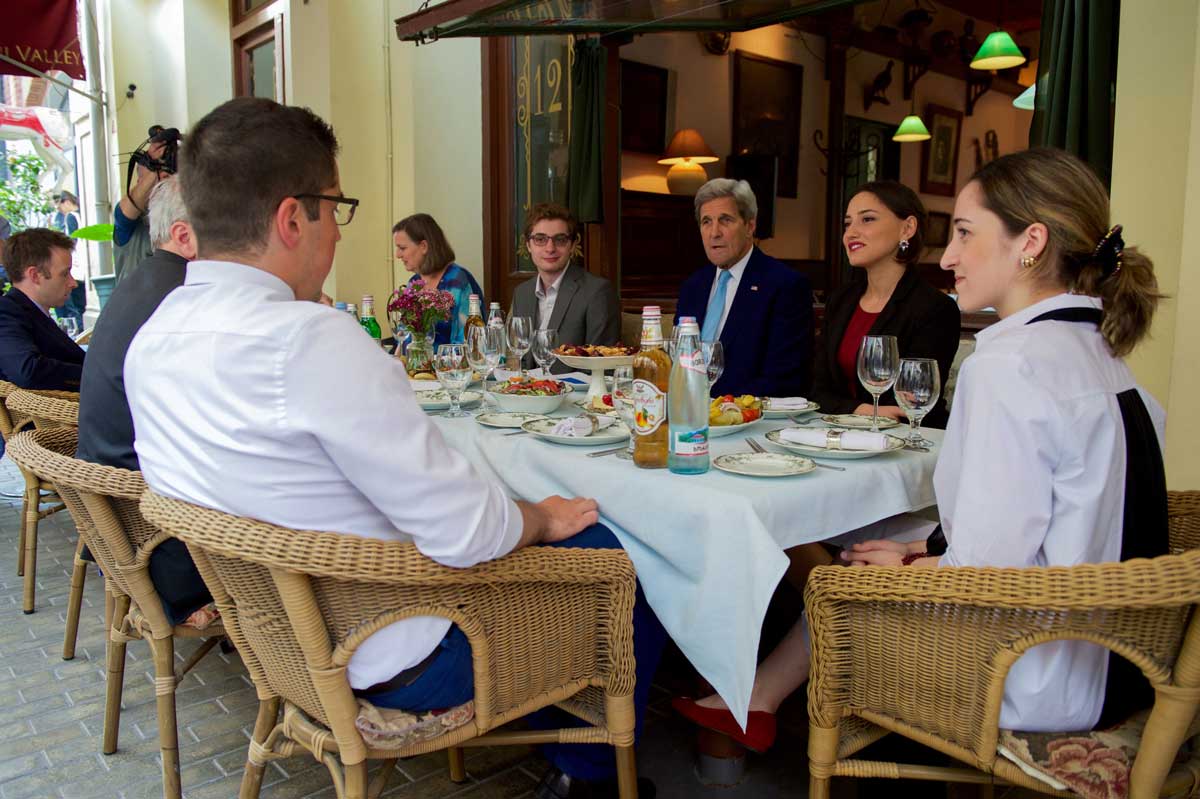On his trip to Georgia in July 2016, Secretary of State John Kerry met with Kesi Katsitadze, a San Diego State University (SDSU)-Georgia biochemistry major and one of the beneficiaries of MCC’s $140 million Georgia Compact. A unique partnership with SDSU is a key component of MCC’s investment to improve the quality of education in the fields of science, technology, engineering, and math (STEM) and increase earning potential for young people in Georgia.
SDSU’s program includes three Georgian universities as local partners — Tbilisi State University, Ilia State University and Georgian Technological University — and offers young men and women the opportunity to earn internationally accredited degrees in STEM fields without leaving their home country. Kesi, a rising sophomore at SDSU-Georgia, runs the university’s Empower Women student’s association and was part of a group of young Georgian leaders that met with Kerry on his trip. In this post, she recalls talking about education, entrepreneurship and politics with Kerry as the group took in the sights of Tbilisi, Georgia’s capital.
When I learned about the upcoming visit of U.S. Secretary of State John Kerry to Georgia, I couldn’t imagine that I would have a chance to meet and talk to him in person. This opportunity was granted to me as I am a student of San Diego State University-Georgia. After his official meetings, at the end of the day, the Secretary met six young Georgian entrepreneurs, and I was among them.

U.S. Department of State
Secretary of State John Kerry (center) talks with young Georgian entrepreneurs over a meal. San Diego State University-Georgia biochemistry student and beneficiary of MCC’s Georgia Compact Kesi Katsitadze (head of the table) had the opportunity to join him during his July 2016 visit to Tbilisi.
The main goal of the meeting was for Secretary Kerry to get to know representatives of the young generation of Georgia. He also wanted to know what young entrepreneurs need to become more successful, what government can do to assist us, and in general what problems we face on the way to reaching our goals. Mr. Secretary was interested to hear about the development of STEM fields in Georgia and whether we lack a qualified workforce in the field.
The San Diego State University-Georgia program, with support and funding from the Millennium Challenge Corporation, aims to promote STEM fields and create professionals educated to recognized international standards in Georgia. As a biochemistry student in this program, I told Secretary Kerry that the existence of these types of programs is essential in Georgia. The program enables the youth of Georgia to get an American education and earn a diploma without leaving the borders of their country. Increasing the number of STEM professionals and the quality of education in technological fields directly correlates to the development of Georgia’s economy.
We also touched upon politics — discussed the reasons for the lack of youth participation in the upcoming elections in Georgia, and relationships between Georgia and its neighboring countries.
Despite the seriousness of the topics discussed, Secretary Kerry kept an informal tone to create a friendly environment. At the end, when one of the Georgian participants of the meeting offered him to visit a nightclub to get acquainted with Tbilisi’s nightlife, he laughed and responded: I have to leave now, but plan to come back, and then we should definitely do that.
After devouring Georgian wine and traditional dishes, we took a walk along Shardeni Street. On the road, Secretary Kerry visited Sioni Cathedral and learned about its history. During the walk, people in the streets greeted him with smiles and even ovations.
Before he left, the Secretary promised us that he would come back after the elections and stay here for a longer period of time. Mr. Secretary was fascinated by that small part of Tbilisi that he got to see in a day. He also confessed that he wants to get away from politics, get involved in the educational field, and collaborate with young Georgian innovators.
I strongly believe that this was an historic visit, which strengthened our friendship with America. It was very important that one of the main leaders of the United States was interested not only in meetings with government officials, but also in the ideas and successful future of Georgian youth.
This blog post originally appeared on the SDSU-Georgia website.

